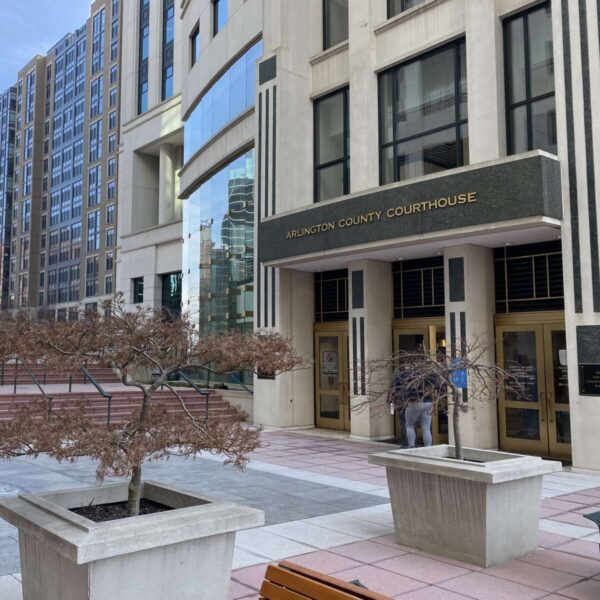
A new restorative justice program launched last week in Arlington, aimed at diverting those under the age of 26 from the criminal justice system.
The “Heart of Safety” program, part of the county’s Restorative Arlington initiative, held its first training session early last week. The program’s goal is to find alternatives to criminal prosecution for certain misdemeanor and felony crimes committed by young adults.
Through a conferencing process managed by trained professionals and facilitators, it will allow both the accused and the victim or victims a choice in how to best deal with the crime committed. The main factor for eligibility is the participants’ commitment to the process, as opposed to determining eligibility based solely on the crime involved.
In practice, however, leaders tell ARLnow that initially “Heart of Safety” will likely focus on certain types of crime to start.
“The determining factor for eligibility is participant commitment to the process,” Kimiko Lighty, Restorative Arlington executive director, wrote to ARLnow in an email. “This program is voluntary at every stage so the engagement of the parties most directly affected by the harm, the person harmed and the person responsible for harm, is the determining factor NOT the type of harm.”
“Initially we will likely focus on assault and battery and grand larceny, as the data mapping with Impact Justice determined that those are the charges with the largest racial and [ethnic] disparities,” she continued. “We believe families are eager for an alternative to traditional criminal prosecution that can maintain public safety by holding young people accountable without saddling their future with a criminal record,.”
The Memorandum of Understanding for “Heart of Safety” was first signed in February by Arlington’s top prosecutor, Commonwealth’s Attorney Parisa Dehghani-Tafti, who campaigned in 2019 on creating a restorative justice program of this nature. The program is being aided by $340,000 in federal funding from the U.S. Justice Department.
In attendance at the training session along with Restorative Arlington leaders were personnel from the Office of the Commonwealth’s Attorney and members of the Juvenile and Domestic Relations Court Services Unit.
The first session “offered information, discussion, and trust building between the two county offices and Restorative Arlington,” according to the press release.
Lighty said the session also dealt with “how restorative justice allows survivors to participate in ways traditional systems do not, how it reduces recidivism in ways that traditional systems do not, and how it provides young people the tools to handle conflict in ways that traditional systems do not.”
The second training session will be held this summer, but an exact date has yet to be finalized.
Additionally, an agreement that would refer Arlington Public Schools students directly to the program is still be worked on. It’s currently in the draft stage and it should be finalized soon, says Lighty.
It has taken more than two years for the promised program to get up and running. Dehghani-Tafti tells ARLnow that a lot of studying, planning, and designing were needed prior to launching something that’s never been done in the county. That includes working with prior victims of crime and those who were formerly incarcerated, to help establish “Heart of Safety” policies and procedures.
“For me, setting up Restorative Arlington has been a labor of love but it is also important that the program run on sound principles and abide by best practices,” Dehghani-Tafti said. “The reason I spent two years working on this before systematically referring… cases, and the reason we are now meticulously training our prosecutors, is that we can all understand which cases are appropriate for restorative justice and which are not.”
“In the end, I want our community to feel confident that Restorative Arlington works, that it treats [both] people harmed and the young people who caused harm fairly, and that it makes us all safer,” she added.
There’s also the perception that restorative justice is “less rigorous and less demanding” than traditional criminal processes.
“It’s the ‘say you’re sorry and hug it out’ myth,” says Lighty. “To the contrary, the central question restorative justice asks of anyone who has done harm is: what actions can you take to repair what you broke?”
Lighty admits that “Heart of Safety” will be under intense public scrutiny, but she believes the broader community is behind them. The fact that the program received 160 applications from those wanting to be staff facilitators was one indicator that it is needed and wanted here, Lightly said.
In the end, she says, it’s about creating a safer Arlington.
“The restorative conferencing process offers the opportunity for both parties to find healing, while mitigating further risk of harm and re-traumatization from legal proceedings and incarceration,” said Lighty. “The way we see it is simple: We can keep using retributive punishment on young people only to have them become adults who commit even more serious crimes, leaving a swath of unaddressed harm in the wake of such incidences or we can invest in a more effective long term strategy to support our youth in becoming thriving members of the community.”

